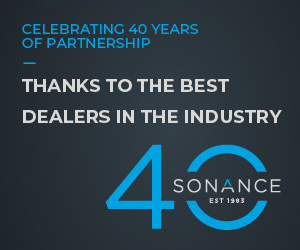
Highlander Partners, L.P., a Dallas-based private equity company, announced today that it has acquired McIntosh Group, a manufacturing and distribution company that offers several high-performance, high-end audio brands such as McIntosh, Sonus Faber, and Sumiko. It also operates under Fine Sounds U.K. and Fine Sounds Benelux.
Read more on the latest change of hands for McIntosh Group
It has been a long and winding road for McIntosh, a once independent manufacturer of high-end transformer-coupled tube amps, preamps, speakers, and more based out of Binghamton, NY. After a long and illustrious history that saw them expand their business around the world, the company began to struggle and was ultimately acquired by Clarion Corp., a large Japanese manufacturer of car stereo gear.
Little did the folks at McIntosh know then that this was but the first step on a long and winding road in which ownership would change hands many times. And like a cat with nine lives, ownership of McIntosh has changed again.
Who is Highlander Partners?
Highlander Partners is a private equity company based out of Dallas, TX, with global offices in Warsaw, Poland, and Bucharest, Romania. Highlander participates predominantly in majority ownership transactions and the company says it has been involved in 80 such transactions with total transaction value of $4 billion.
It currently holds investments worth $2 billion with a portfolio that includes the McIntosh Group. The only other tech holding in their portfolio that I recognized was Biamp, a predominantly Pro AV provider that was acquired in 2017.
Moving to More Consumer Facing Businesses
We have been evolving our investment strategy around consumer-focused brands and luxury goods over several years. The opportunity to acquire brands as strong as those within the McIntosh Group does not come often and we are very excited to be part of the Company’s next chapter. We believe there is a unique opportunity to aquire other consumer luxury technology brands and intend to stay active in the category.
Jeff Hull, Highlander Partners President and CEO
On its website, Highlander offers an analysis of how it differs from other private equity groups. (Highlights added by me…)
- We only invest our own capital (including all members of our team), and we do not have outside limited partners;
- We have complete flexibility in our capital structures and no limits or restrictions on our investment decisions;
- We have no defined investment horizon deadlines or artificial timelines, making us a patient, long-term partner with a focus on sustainable long-term value creation;
- We have been operators in our past experiences and support entrepreneurial cultures; and
- We are not bureaucratic and maintain total flexibility for our portfolio companies, while maintaining lower levels of leverage than most private equity firms.
An ‘Excess of Opportunity’
We are thrilled to continue to pursue our growth trajectory alongside the Highlander team. Across all brands and product categories we continue to see remarkable results and an excess of opportunity; we believe Highlander’s financial approach and operational expertise can help seize these prospects.
Jeff Poggi and Charles Randall, McIntosh Group co-CEOs

For some time now, I have been hearing a lot of unconfirmed rumors of financial difficulties surrounding McIntosh. These rumors really flared up when the company closed its NYC showroom. I spoke to a McIntosh executive at the time and he vigorously denied any financial issues.
A New Sheriff in Town
In any event, whether the rumors are true or not, there’s a new sheriff in town with supposedly the resources to move the company forward. As was true with each of their former private equity owners, we’ll just have to wait and see what happens now.
Learn more about McIntosh by visiting: mcintoshlabs.com.
Learn more about Highlander Partners at: highlander-partners.com.









Mac has seen a lot of ownership changes over its recent past but has stayed alive because of its ability to provide quality products and the equity of its legacy.
That being said, they have historically alienated numerous industry professionals by allowing independent manufacturers reps the opportunity to build a strong dealer network for the brand in their territory and then relieve them of the opportunity to reap the rewards of their efforts.
I can personally testify as a “former” Mac dealer that with the current management of the brand, being a Mac dealer is a relationship that is one of dictatorship, not partnership, which may have more to do with their financial hardship than Mac would ever admit or for that matter could even perceive.
If you note the press release surrounding this it talks about McIntosh (and Sonus Faber) as “luxury goods” and “works of art” but spends little time talking about sound quality, which is supposedly their raison d’être.
Perhaps they won’t but I see this ending in offshoring of much McIntosh manufacturing and maintaining McIntosh as a luxury label as we soon see high priced wireless McIntosh earbuds and Sonus Faber car speakers (as McIntosh already has a car audio deal with Jeep.)
After 45 years in the audio business, my conclusion has been for at least a decade now that McIntosh continues to slowly trade goodwill for profit. I’m sure the current stuff sounds very good, like 10.000 other brands out there. Is it worth the money? For some, sure. For most audiophiles, I highly doubt it. For the brand’s sake, I concur with the promoters who emphasize “artistry and luxury”. that’s where the niche for them is….
If I had the money, you ask? Why, Conrad Johnson, of course! That’s my idea of artistry, luxury, integrity, the best materials money can buy, and a long history of stable engineering and marketing…
Having been involved with the McIntosh Group, I do not think this is initially as ominous as other observers. They are in good financial shape and their biggest problem now is keeping up with demand, which is very difficult with continuing parts shortages and delays.
Like it or not, luxury is the operative (overused) word these days. Harman created the Luxury Audio Group. What evolved from the Fine Sounds Group to the McIntosh Group could become the McIntosh Luxury Group.
The point of the McIntosh townhouse was to impress and entertain guests, have meetings, and to rent the space out for events (fashion, music, etc.). Renting it to other “luxury” companies for events actually paid the rent. When Covid hit everything stopped and they couldn’t entertain guests or rent it to anyone else for an event, so there was no point in renewing the lease.
LBO France and Yarpa, the previous investors that just sold it had owned Mc Group for eight years, which is a long time in PE-land. Who knows what the expectations of Highlander are, but if it is meteoric growth they won’t be happy. McIntosh’s large b&m retail network can’t grow that much more than it is now, so online must be the direction they will pursue. Is the allure of the iconic look sufficient to pull in that many more buyers? Can they put blue meters on earbuds?
Getting passed from one PE group to another is a death spiral because each transaction saddles the company with more debt.
I’m a McIntosh owner, having owned several other audiophile brands. Yes there are a lot of other excellent sounding products out there now and a lot that sound better at the same price point. But a lot of folks like the brand. I’ll admit, buying a $10,000 Technics receiver vs. a McIntosh is an easy choice.
Business-wise: McIntosh has been putting out too much garbage. They just released a plain box for $1500? And an AM/FM Tuner probably for $5,000 with no HD or XM radio. Somebody at their company also produced a series of clothes and mugs that look awful, like motorcross long sleeve tshirts. Also, an amplifier stand? And all the new table top format products that seems like rehoused products. And the MTI100 turntable looks like a Frankenstein monster..
How much are they spending on product development, marketing, and manufacturing these products? No way they’re selling. Or adding net revenue.
They need product focus.